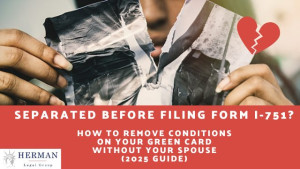By Richard T. Herman, Esq.
Quick Answer Box
Yes. You can still file Form I-751, Petition to Remove Conditions on Residence alone if you are separated, divorced, or your spouse refuses to sign — by requesting a waiver of the joint filing requirement.
You must show that your marriage was entered in good faith and provide strong documentary evidence to prove it.
I. Introduction: When Love Ends, But Your Immigration Journey Continues
Few moments are more stressful than realizing your 2-year conditional green card is about to expire—and your marriage has ended. When your conditional green card expires, it directly affects your permanent residency status, as maintaining lawful status depends on following U.S. immigration laws that govern this process. Maintaining your legal status is crucial during separation or divorce, and you must take specific steps to preserve your legal status in the U.S.
But here’s the good news:
you can still remove conditions on your green card even without your spouse. The law recognizes that marriages can end for genuine reasons, and the U.S. Citizenship and Immigration Services (USCIS) allows several waiver options to file Form I-751 on your own.
As an immigration attorney with over 30 years of experience, I’ve guided hundreds of clients through this exact challenge. Whether you’re recently separated, divorced, or facing an uncooperative spouse, this guide will walk you through every option, the evidence USCIS will require, and how to protect your status in 2025.
II. Why USCIS Gives You a “Conditional” Green Card
When you obtain a marriage-based green card less than two years after your wedding, USCIS grants conditional permanent residence—valid for two years. This is known as conditional resident status, the official term for the two-year period before you can apply to remove the conditions on your green card. This conditional status exists because USCIS requires evidence that your marriage is bona fide for immigration purposes, and is not entered into solely for the purpose of evading immigration laws. This ensures your marriage was entered in good faith, not solely for immigration benefits. Submit the I-751 petition during the 90 days before your conditional green card expires.
You must file Form I-751 during the 90-day window before your card expires to prove the marriage was authentic.
Fast Fact:
If you fail to file Form I-751 on time, your green card automatically expires, and you may fall “out of status.” USCIS can even place you in removal proceedings before an immigration judge.
Chart: Marriage vs. Divorce — I-751 Filing Options at a Glance
| Situation | Who Signs the I-751 | Filing Basis | Can You File Alone? |
|---|---|---|---|
| Still married | Both spouses | Joint petition | ❌ No |
| Legally separated or divorced | You only | Divorce waiver | ✅ Yes |
| Abused by U.S. citizen or LPR spouse | You only | VAWA waiver | ✅ Yes |
| Spouse deceased | You only | Widow(er) waiver | ✅ Yes |
| Extreme hardship | You only | Hardship waiver | ✅ Yes |
In cases of divorce or legal separation, you may file separately from your spouse by requesting a waiver.
III. Can I File I-751 Alone After Separation or Divorce?
Direct Answer :
Yes. You can file Form I-751 individually by requesting a waiver of the joint filing requirement.
You’ll need to select one of the USCIS-approved waiver categories and submit strong proof that your marriage was genuine, even though it ended.
The Three Main Waiver Types (2025):
There are three main waiver based options for the joint filing requirement on Form I-751. Each waiver is based on specific circumstances, such as divorce, abuse, or extreme hardship:
- Divorce or Annulment Waiver — You married in good faith, but the marriage ended in divorce or annulment.
- Battery or Extreme Cruelty Waiver (VAWA) — You were in or have experienced an abusive situation, such as being abused by your spouse during the marriage.
- Extreme Hardship** Waiver** — Removing you from the U.S. would cause extreme hardship, even if still married. The hardship must be significantly greater than what is typically experienced by other foreign nationals who are removed to qualify for an extreme hardship waiver.
👉 Expert Tip:
You can file your I-751 as soon as your divorce is final—you don’t have to wait for the 90-day window.
IV. What Evidence Does USCIS Require for a Divorce or Separation Waiver?
Even though you’re filing alone, USCIS will still expect proof that your marriage was real. You must submit evidence and provide evidence of your marriage, such as joint financial records, photos, or affidavits. Other evidence, including personal statements or documentation of other events like abuse, divorce, or the death of a spouse, can also support your case. The key is to demonstrate good faith intent, not perfection. USCIS must consider any credible evidence relevant to a waiver request submitted by the CPR.
Types of Evidence to Include:
- Joint financial documents: Tax returns, bank statements, mortgage or lease agreements.
- Shared living proof: Utility bills, driver’s licenses showing same address.
- Photos and communications: Travel receipts, messages, or letters between you.
- Children’s birth certificates (if applicable), as evidence of children born to the marriage can help demonstrate the genuine nature of your relationship.
- Affidavits from friends, family, or clergy confirming your relationship.
- Final divorce decree or legal separation document. When filing Form I-751 after divorce, a conditional permanent resident must provide a finalized divorce certificate to demonstrate eligibility.
- Other important documents: Include any additional important documents or credible evidence that support your case, even if some documents are missing.
Comparison Table: Joint I-751 vs. Waiver I-751 Evidence
| Evidence Type | Joint Petition | Divorce Waiver |
|---|---|---|
| Joint tax returns | Required | Strongly recommended |
| Joint lease/mortgage | Required | Strongly recommended |
| Divorce decree | Not applicable | Required |
| Affidavits | Optional | Highly recommended |
| Shared bills/photos | Required | Required |
Key Insight:
USCIS officers are trained to look for continuity of life together — not perfection. Even couples who later divorced can demonstrate good faith through honest records of their shared life.
V. What If My Green Card Expires Before I File the I-751?
If your conditional green card expires, you technically fall “out of status.” But don’t panic—there are still options.
It is important to notify USCIS promptly of any change of address or significant updates, such as separation or divorce, to ensure compliance and avoid delays or suspicion of fraud.
If you have not yet filed Form I-751, you should do so as soon as possible, even if your divorce is still pending. When the I-751 is filed and your divorce is not yet finalized, provide documentation showing the pending divorce to support your petition. USCIS understands that delays can occur due to circumstances such as a pending divorce or other valid reasons.
Important Note:
USCIS may accept late filings if you can show good cause and extenuating circumstances, such as: CPRs may file waiver requests at any time before, during, or after the 90-day period immediately preceding the second anniversary of the CPR receiving status as a permanent resident.
- Divorce delays or ongoing divorce proceedings
- Illness or domestic abuse
- Financial hardship
- Legal confusion about eligibility
Include a detailed written explanation with your late petition.
VI. What If My Spouse Refuses to Sign the I-751?
This is one of the most common issues we see at Herman Legal Group.
The standard process for removing conditions on your green card involves filing jointly with your permanent resident spouse to show your marriage was genuine. However, if your permanent resident spouse refuses to cooperate or sign, you can still file alone under the waiver categories mentioned above. If you are seeking a divorce waiver, you must have a finalized divorce decree from a state court before filing Form I-751 separately.
Fast Fact:
You do not need your spouse’s consent or signature to file Form I-751 alone.
Your eligibility is based on the good-faith nature of your marriage, not your spouse’s participation.
VII. How Long Does USCIS Take to Process I-751 Divorce Waivers in 2025?
Processing times have varied significantly across USCIS service centers. The entire process can take many months and requires patience.
Average 2025 I-751 Divorce Waiver Processing Times
| USCIS Service Center | Estimated Processing Time |
|---|---|
| California Service Center | 20–28 months |
| Vermont Service Center | 16–24 months |
| Texas Service Center | 18–30 months |
| Potomac Service Center | 22–30 months |
| Nebraska Service Center | 18–26 months |
At a Glance:
- You’ll receive a 48-month automatic extension notice when filing Form I-751 in 2025.
- This letter + expired green card = valid proof of status and work authorization.
You can check live updates using the USCIS Processing Times Tool.
VIII. Can I Travel or Work While My I-751 Divorce Waiver Is Pending?
Yes. Once USCIS issues your receipt notice, your conditional residency and immigration status are automatically extended for 48 months.
That means you can:
- Work legally using your expired card + receipt notice.
- Travel internationally and reenter with both documents.
Need to Know:
If you travel abroad for more than six months, USCIS or CBP may question your residency intent.
If your I-751 is pending and you reenter, always carry:
- Expired green card
- USCIS extension letter
- Copy of your I-751 filing receipt
IX. What Happens If My I-751 Is Denied After Separation or Divorce?
If USCIS decides to deny your I-751, they typically refer your case to immigration court for removal proceedings. If USCIS denies your petition, it may be due to incomplete evidence or concerns about immigration fraud, so addressing these issues is critical to your case. A denial can have serious consequences, including the potential loss of your lawful permanent resident and permanent resident status. You’ll then have another opportunity to prove your case before an immigration judge (IJ).
Expert Tip:
Many denials result from missing evidence or weak affidavits.
In removal court, you can present new evidence or request a joint motion to reopen if your divorce was still pending during the initial filing.
If your case goes to court, retain an experienced immigration attorney immediately. Firms like Herman Legal Group handle these complex cases nationwide, especially in Cleveland and Columbus, Ohio, where we have decades of success representing immigrants in I-751 waiver hearings.
X. Top Law Firms Experienced in I-751 Divorce Waivers (2025 Reviews)
| Law Firm | Location | Key Features | Reviews |
|---|---|---|---|
| Herman Legal Group | Cleveland & Columbus, OH (national) | 30+ years of experience, multilingual team, nationwide waiver filings, personal guidance from Richard T. Herman, Esq. | ★★★★★ |
| Fragomen, Del Rey, Bernsen & Loewy LLP | Nationwide | Global immigration firm, extensive resources | ★★★★☆ |
| Murthy Law Firm | Maryland | Leading family and employment-based immigration practice | ★★★★☆ |
| Siskind Susser P.C. | Tennessee | Trusted advocacy and USCIS litigation | ★★★★☆ |
| Immigration Law Group of Chicago | Illinois | Strong record with I-751 waiver approvals | ★★★★☆ |
XI. Resources and References
- USCIS Form I-751 Official Page
- USCIS Processing Times Tool
- USCIS Policy Manual: Volume 12, Part G (Conditional Residence)
- Department of Justice – EOIR Practice Manual
- American Immigration Lawyers Association (AILA)
- Herman Legal Group Consultation Page
XII. Key Takeaways
- You can file Form I-751 alone after separation or divorce using a waiver.
- The most common waiver is the divorce waiver, requiring proof of a good-faith marriage.
- Waivers are also available for those who have experienced abuse by an abusive spouse; special protections exist under immigration law for victims of battery or extreme cruelty.
- USCIS demands strong evidence — joint finances, photos, leases, and affidavits.
- You can work and travel legally with the 48-month USCIS extension notice.
- Late filings may still be accepted if you show good cause.
- If denied, you can fight your case in immigration court.
- Successful removal of conditions is an important step toward the naturalization process for U.S. citizenship.
- Always consult a trusted attorney, like Herman Legal Group, to guide you through your I-751 waiver journey.





